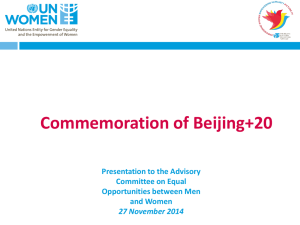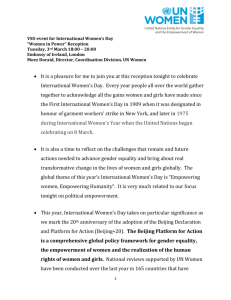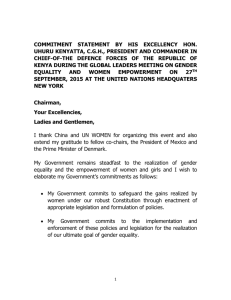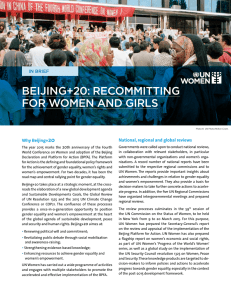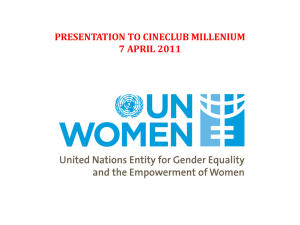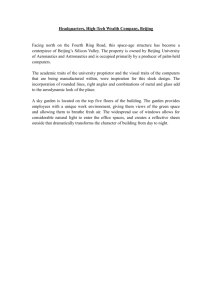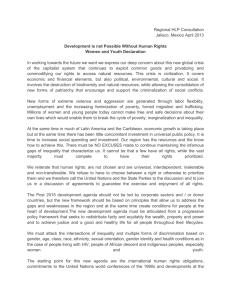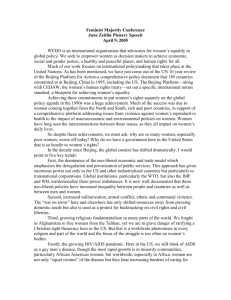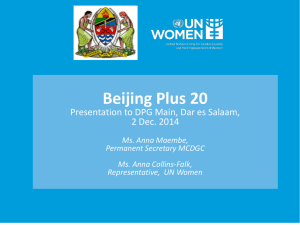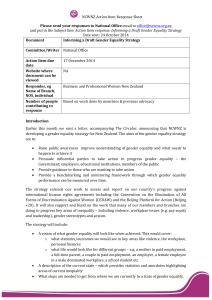What can women expect from the UN? Natalie Samarasinghe, UNA
advertisement
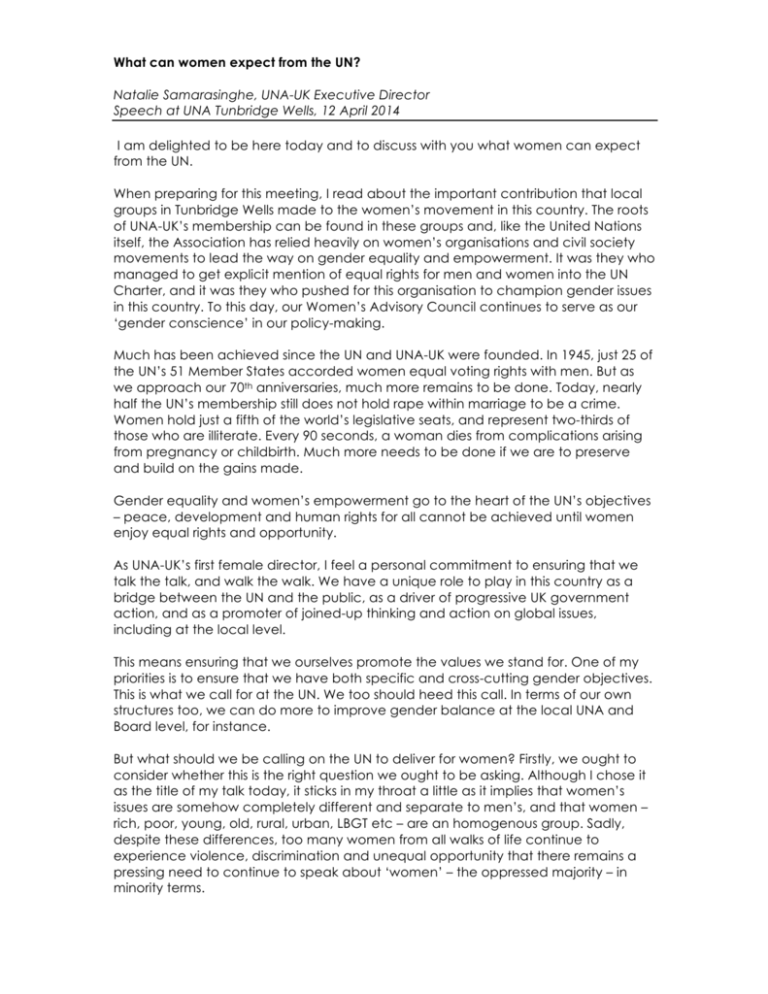
What can women expect from the UN? Natalie Samarasinghe, UNA-UK Executive Director Speech at UNA Tunbridge Wells, 12 April 2014 I am delighted to be here today and to discuss with you what women can expect from the UN. When preparing for this meeting, I read about the important contribution that local groups in Tunbridge Wells made to the women’s movement in this country. The roots of UNA-UK’s membership can be found in these groups and, like the United Nations itself, the Association has relied heavily on women’s organisations and civil society movements to lead the way on gender equality and empowerment. It was they who managed to get explicit mention of equal rights for men and women into the UN Charter, and it was they who pushed for this organisation to champion gender issues in this country. To this day, our Women’s Advisory Council continues to serve as our ‘gender conscience’ in our policy-making. Much has been achieved since the UN and UNA-UK were founded. In 1945, just 25 of the UN’s 51 Member States accorded women equal voting rights with men. But as we approach our 70th anniversaries, much more remains to be done. Today, nearly half the UN’s membership still does not hold rape within marriage to be a crime. Women hold just a fifth of the world’s legislative seats, and represent two-thirds of those who are illiterate. Every 90 seconds, a woman dies from complications arising from pregnancy or childbirth. Much more needs to be done if we are to preserve and build on the gains made. Gender equality and women’s empowerment go to the heart of the UN’s objectives – peace, development and human rights for all cannot be achieved until women enjoy equal rights and opportunity. As UNA-UK’s first female director, I feel a personal commitment to ensuring that we talk the talk, and walk the walk. We have a unique role to play in this country as a bridge between the UN and the public, as a driver of progressive UK government action, and as a promoter of joined-up thinking and action on global issues, including at the local level. This means ensuring that we ourselves promote the values we stand for. One of my priorities is to ensure that we have both specific and cross-cutting gender objectives. This is what we call for at the UN. We too should heed this call. In terms of our own structures too, we can do more to improve gender balance at the local UNA and Board level, for instance. But what should we be calling on the UN to deliver for women? Firstly, we ought to consider whether this is the right question we ought to be asking. Although I chose it as the title of my talk today, it sticks in my throat a little as it implies that women’s issues are somehow completely different and separate to men’s, and that women – rich, poor, young, old, rural, urban, LBGT etc – are an homogenous group. Sadly, despite these differences, too many women from all walks of life continue to experience violence, discrimination and unequal opportunity that there remains a pressing need to continue to speak about ‘women’ – the oppressed majority – in minority terms. The statistic that really grabbed me is one we featured in our magazine three years ago. It was so unbelievable that colleagues must have fact-checked a dozen times to ensure its accuracy: women perform 66% of the world’s work and produce 50% of the world’s food, but earn just 10% of global income and own just 1% of property. The picture is not all bleak. There are positive stories from around the world, like Liberia, which does well in terms of political representation; like Mongolia, where there is virtually no gender gap in health; and Botswana, where there is gender parity in education – through a leadership, legislation and policies. But it remains the case that women everywhere, for all their differences and varying levels of rights and protection, need a more fundamental transformation for true equality to be achieved. This is not just a developing country issue. The UK, for instance, does not meet the UN target of 30% in terms of women in Parliament. More than 40 years after the Equal Pay Act, women working full time in the UK still get around 15% less per hour than men. Campaigning for specific laws, programmes aimed at boosting girls’ education – these things are necessary. They deliver for individual women and, as successive studies have shown, are one of the best investments in terms of returns for families and communities. But we also need to look at our systems as a whole. The debate should not be about wanting the same for women as for men, but wanting something better for everyone. Like climate change, real equality of opportunity requires profound shifts in our economies, lifestyles and mindsets. For centuries, communities, companies, entire countries, have been subsidised by unpaid work. Recognising this work, valuing it and distributing it equally; changing our perceptions of success, of the domestic sphere; improving our work places and culture – these things need much more than legislation. One thing that gives me hope is that we have an excellent blueprint for moving forward – the Declaration and Action Plan agreed at the 1995 UN World Conference on Women Conference in Beijing. The Declaration celebrates in 20th anniversary next year and we have a real opportunity to make progress on this agenda through the new development goals due to be agreed at the UN next September. Nearly 20 years on, the document remains highly relevant and enduring in principle, scope and ambition. It combined human rights, peace and security, development, environment, finance, humanitarian, health and social issues, violence, international law and justice in a meaningful way, and broke new ground in recognizing both the shared and different experiences of various constituencies of women around the world. It also formalised a number of principles that are now widely recognised: The need to target women in development programmes and to involve them in their design and delivery. The gender impact of conflict and the diversity of roles that women play, not just as victims of violence but also as agents of peace and of war. And it unequivocally backed the need for both specific and integrated gender policies. It is often said that seminal documents like the Universal Declaration of Human Rights would be far less progressive if drafted today. This is probably more true of Beijing than anything else. Next year’s commemoration is not considered to be an opportunity to improve and update the document – the risks of watering down are too great. Instead, the UN will focus on implementation, a sound approach but also somewhat sad. The past decade has seen a renewed backlash against women’s issues at the UN. Two years ago, the Commission on the Status of Women (CSW) was unable to reach agreement on what might be considered a theme without great controversy: rural women and their role in poverty alleviation. Last year’s CSW nearly went the same way. This year, UNA-UK sent two delegates to the meeting, which was on the gender dimension of the Millennium Development Goals and what should follow them. Hayley Richardson, our Policy & Advocacy Officer, produced a report after the meeting which summarised the gist of this backlash: • The resurgence of conservative voices from across the world, including within Europe, on sexual and reproductive health and rights. • A refusal to engage with issues related to sexual orientation and gender identity. • Calls for a return to definitions of womanhood and women’s issues based on motherhood and “traditional families”. • More worryingly, growing voices in favour of separating human rights from development, leading to difficulties on the inclusion of rights language. • And most worrying of all, powerful voices call for “sovereignty” – i.e. national laws and traditions – to trump international norms. Unfortunately, this backlash is likely to continue as we move through a period of instability and rebalancing. At present, many states are increasingly reluctant to look outwards. World leaders are struggling to balance economic recovery with political stability, and freedoms with security. This is compounded by a crisis of confidence, with public trust in political and economic systems eroding. At the same time, traditional structures for popular power seem to be fading before new models have really found their feet. Together, these factors have produced a severe deficit in leadership, with the international community increasingly multipolar and polarised. For the women’s agenda, this has meant uncertainty. Women have been disproportionately affected by the downturn, in direct ways – the loss of public sector and part-time jobs, as well as indirectly, through correlative increases in violence against women. Gender programmes seem to be the first to go when times get tough – whether it’s funding for women’s shelters or contributions to UN Women. There have been positive developments too. Since Beijing, the women, peace and security agenda has been embraced at the Security Council. Rape has been recognised as a war crime. Issues that were previously taboo – sexual violence in conflict – are now on the table, not least due to efforts by the UK Foreign Secretary. On the development front, despite its flaws, the MDG initiative has delivered for women in certain areas, notably in education and communicable diseases. Where they haven’t delivered, they have highlighted priority areas for the next goals – maternal mortality, and economic and political empowerment for instance, as well as better targeting and data collection. And in institutional terms, we have seen the relatively swift creation of UN Women – which has given gender issues a real boost in terms of visibility, voice and coordination. In the coming year, I hope women will benefit from a renewed focus on implementation. Next year’s review of progress on the Beijing agenda offers an opportunity for strong statements and a re-dedication of the international community to the document it adopted 20 years ago. I hope that this will include constructive criticism with offers of adequately resourced support, as well as a strong element of naming and shaming. The post-2015 development agenda is a crucial opportunity to take forward the Beijing agenda on the ground. UN Women, and UNA-UK, have consistently called for the new agenda to include a standalone goal on gender equality and empowerment, as well as targets on gender in each of the other goals. We were delighted that states at the 2014 CSW endorsed this proposal. At present, there are positive signs that the new goals will take a more rounded approach to development, drawing in peace, human rights and sustainability as interrelated and essential issues. It also looks to move much more in the direction of the transformational shifts I spoke about earlier, with targets on gender equality in the distribution of capabilities and equality in decision-making at all levels, from parliaments to families. These targets are being distilled into concrete measures, such as the ability to open a bank account, legal protection against domestic violence and time devoted to domestic tasks. To be effective, the new framework needs adequate and secure funding at both the national and international level. It is time to update the Beijing target of 20 per cent of aid and national budgets taking gender into account. States should follow the UK’s lead in enacting legislation to ensure that gender is taken into account in all decisions on aid, retaining the 20 per cent for specific gender programmes. At the UN, we hope that states will mark the 20th anniversary by agreeing extra funding for UN Women. When UN Women was created, UNA-UK joined many others in calling for it to have a budget of at least $1 billion dollars. In the end, $500 million was agreed, with just 1.4% coming from the UN’s regular budget. Finally, I hope we can expect leadership by example from the UN. Ban Ki-moon has made women and gender issues a priority, and he has done much to improve the composition of his Senior Management Team, boosting women appointed to senior roles by over 40% since he took office. But the UN’s own gender gap remains significant, particularly where country- and conflict-related roles are concerned. UNA-UK will be working over the next 18 months to influence the post-2015 debate, and to support the implementation of the women, peace and security agenda. We continue to push the UN to take action to improve human resources, and we plan to run a campaign on the appointment of the next Secretary-General that we hope will raise awareness of this issue in wider terms. And we will continue to support UN Women – publicising its work, hosting its officials and campaigning in Parliament for stronger UK support. Our work on the general election will give us all a chance to look at national gender priorities, as well as the UK’s role in moving forward at the international level. We hope to support local UNAs in conducting events and hustings on foreign policy issues, and I look forward to discussing with you which issues will resonate in your local communities, and how we can tie these in with national and global objectives.
